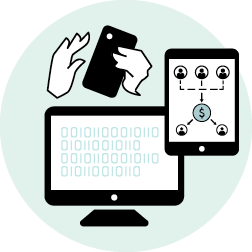Part-time job. Temp work. Side hustle. Whatever you call it, non-traditional and supplementary employment has been around in different forms for a hundred years and more.
The number of participants in such work rose after the Great Recession killed the job market and slowed its recovery for seven years, and a whole new beast was born: the gig economy.
Gig work has its benefits, but it also can cause financial worry among gig workers, who often are uncertain about their next job and paycheck. Business owners can offer a little bit of relief from both financial issues and accompanying anxiety: fast access to wages.
The Gig Economy Defined
While there is no single definition of gig economy, generally it refers to non-traditional work arrangements or short-term work arrangements: freelancing, consulting, independent contractors and professionals, temporary contract work, and so on.
While the notion of a gig worker isn’t new, three significant elements of non-traditional work have changed:
- Gig work has become an attractive choice to workers who prefer the freedom and flexibility it allows.
- For others, gig work isn’t a choice; it’s become a necessity, either because they can’t find jobs or they need supplemental income.
- Gig workers now have freelance job platforms to help find work, booking engagements through websites such as Upwork, Fiverr, TaskRabbit, and Instacart. These and many other online platforms have lowered barriers to entry and made independent work easily accessible to growing numbers of people.
Those numbers are indeed growing. Some 57 million Americans rely on freelance and contract work for at least part of their pay, and by 2027, that number could increase to 86.5 million. All told, about one-third of U.S. workers participate in the gig economy. Compare that to Bureau of Labor Statistics (BLS) data that shows only about 9% of workers had alternative employment arrangements 15 years ago.
And for many, gig work isn’t a side hustle. It provides primary income for 44% of freelance and contract workers, according to Edison Research. That number rises to 53% for workers ages 18-34.
Of course, the gig economy wouldn’t be where it is today without the other main participant: employers. One-third of U.S. companies use gig workers extensively, the BLS says. And 70% of the executives in a recent survey said that they expect to use more of those workers, according to a recent McKinsey report.
Some Love Gig Work . . .
One in six workers in traditional jobs would like to become fulltime gig workers, according to McKinsey, and overall, about 30% of gig workers choose independent work as their fulltime occupation. What makes gig work attractive to some? Workers cite several reasons:
- Flexibility to better manage their schedules and balance work with their personal lives.
- Fulfillment that comes from handpicking work and choosing projects that they’re passionate about.
- Variety both in projects and income sources, which can hold their interest and limit reliance on any one company.
Those and other advantages can add up to greater job satisfaction overall. People with more control over their schedules and job responsibilities tend to be significantly more satisfied with their work, whether they are traditional employees or gig workers.
. . . But Others Don’t
While it’s clear that some gig workers are satisfied with that status, others aren’t. Fully 62% of contract, freelance, and temporary workers would prefer to work as permanent employees, according to McKinsey. Among workers who work a gig in addition to a full-time job, or have multiple gigs, one-third do so out of financial need, a 2019 New York Times survey reported.
Ironically, gig work itself can contribute to financial instability. Work can ebb and flow, as it did during the pandemic; gig work for creatives plummeted for a time, but grocery delivery services flourished. Gig workers don’t typically get benefits, and often either go without them or pay considerably more than their salaried peers for protections such as health insurance.
As a result, gig workers are more anxious about their finances: 45% of fulltime gig workers reported high economic anxiety as opposed to 24% of traditional fulltime employees, according to one study. This is where fast access to wages comes in.
Paying Workers More Often Can Help
Real time access to wages can make a big economic difference to many employees, including gig workers. Paying workers more often – particularly those who make less and may have less of a savings buffer to help between paychecks – smooths out their often sporadic income and can help them avoid financial problems. Knowing they will get paid immediately can be an extremely meaningful incentive to accept an assignment or show up for a job, which is valuable to businesses relying on temporary workers.
Business owners can offer flexible payment options that pay employees immediately and help eliminate the problems a typical one- or two-week payroll schedule can cause. With such an option, an employer can give employees instant access to their wages as often as they like, even at the end of every shift. Payments can be direct-deposited to an employee’s debit card with no interim steps needed to get instant access to their money.
A New Way to Pay in a New Economy
The gig economy brought big changes in employment for millions of Americans, and such changes continue. In addition to the disruption to the job market caused by the pandemic, political winds may be shifting, too, with the current administration signaling that it believes many gig workers should be classified as employees and entitled to all that implies, including benefits.
Whether the status of gig workers changes or not, non-traditional work likely is here to stay. Companies that continue to employ gig workers will need the means to attract them – and fast access to pay would help. In fact, 85 percent of gig economy workers said they would work more often if they could get paid faster, a 2019 PYMNTS report says. If a business wants to attract and retain gig workers, fast access to pay seems like a sure way to do it – a new way to pay workers in a new economy.
MerchantE's EmployeePlus Payouts is helping you pay instantly.
See it in action:




